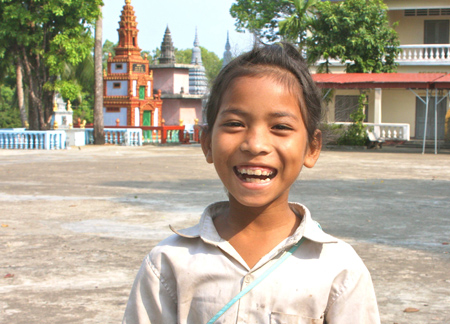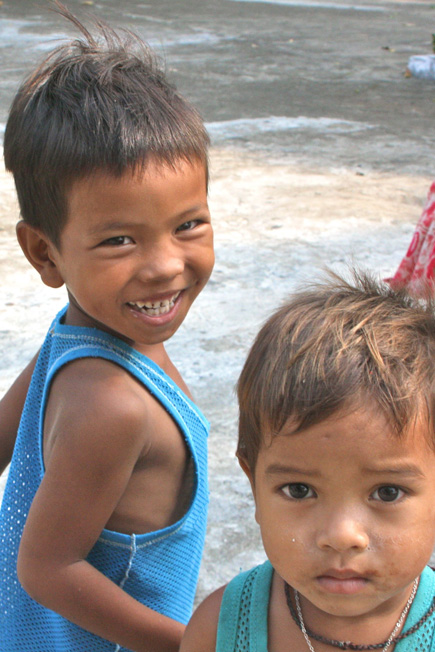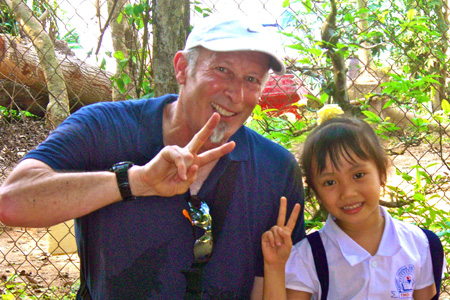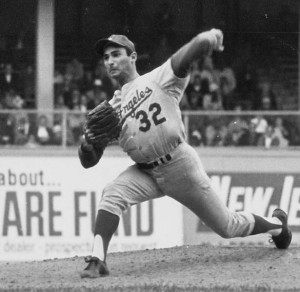
How fortunate our lives are. How hard it is for so many. I know our sons have no idea how the majority of the rest of the world lives today or have suffered over the centuries. Returning from Southeast Asia, my wife and I were heartily reminded of the harsh lives so many people on this planet live. Yet, we were equally struck by the joy that we so often witnessed on the faces of people who live, by our standards, with so little. If we open our hearts there are many lessons learned from the poor.
There are too many numerous examples to offer, but I think some of the best of them can be a reminder to all of us that the single biggest ingredient to happiness is gratitude. It took me about half my life to fully learn this lesson but it’s engrained in me now, and this trip was just a dramatic additional demonstration of how it’s our attitudes, not our circumstances that define us as human beings.
Cambodian Girl – Photo by Bruce Sallan
 Cambodia was without a doubt the saddest country we visited, with the impact of the Khmer Rouge still evident everywhere and on every face. A man who survived the horrors of that devastating period guided us. He didn’t tell us his story until near the end of our day’s tour. Prior to that, he had shared how he had become a tour guide, a teacher, and other jobs. Later, he matter-of-factly told us that he and one sister were the only surviving members of his large family, the rest of whom were slaughtered by the Khmer Rouge. The uncomfortable humidity we’d experienced all day seemed a minor irritant upon digesting the gravity of his words.
Cambodia was without a doubt the saddest country we visited, with the impact of the Khmer Rouge still evident everywhere and on every face. A man who survived the horrors of that devastating period guided us. He didn’t tell us his story until near the end of our day’s tour. Prior to that, he had shared how he had become a tour guide, a teacher, and other jobs. Later, he matter-of-factly told us that he and one sister were the only surviving members of his large family, the rest of whom were slaughtered by the Khmer Rouge. The uncomfortable humidity we’d experienced all day seemed a minor irritant upon digesting the gravity of his words.
In most of Southeast Asia, the mode of transportation is the ubiquitous motor scooter. The sheer number of them in all the big cities was stunning in their variety, their daring and crazy driving, and what they carried on these tiny two-wheeled bikes. Families of four were commonplace. Groceries that would fill the typical American mini-van were strapped and carried on them. My favorite site was a boxed refrigerator, precariously balanced behind a man guiding his scooter through the throngs of traffic.
A majority of these commuters wore surgical masks due to the incredible pollution prevalent in so many of these larger cities. Seeing young women wearing their business clothes along with high heels was also an enduring image. Obviously, the traditional roles of men and women have been affected in this part of the world as much as in Western society with women working and evident in every place we visited.
Most of cities we visited had their versions of suburbs. They were quite unlike the typical American suburb, in which every convenience is available and every fast food franchise is present not to mention the starkly contrasting sense of cleanliness. Rather, these mostly dusty, drab, and dirty shantytown looking areas were lined with tiny shacks and businesses in which the proprietors displayed their wares — food, electronics, household items, etc. — either openly, on the street, or in the most basic of displays. Contrasting these ramshackle, huff-and-puff-and-you-blow-em-down huts would be the ubiquitous ads for mobile phones and other modern advertisements adorning these corrugated steel and driftwood-like structures.

Bruce with Vietnamese girl – Photo by Debra Usher
In the larger markets, their unique versions of our farmer’s markets, the displays of exotic fruits, vegetables, and unimaginable fare from the sea would be in full view, in as unhygienic a manner as you could possibly imagine. The people working these stalls, jammed next to each other, would be constantly active in a hive-like buzz of activity. Some were chopping up fish parts while others were cooking. In Cambodia there were maimed beggars lining the narrow passages between the different areas of these markets, and children were everywhere.
It was the children that had the greatest effect on me — in the best way. There was not a child I met who didn’t have a smile on his or her face. “Joy” was the word that so often came to mind seeing the visage of their dirty faces, their tattered clothes, and their under-fed, skinny bodies. Joy at just being alive.
Capitalism at its greatest, some might say worst, was evident in Hong Kong. “Evident” is an understatement given the incredible amount of construction, high-rises, stores, and tumult that grabs you the moment you enter this compacted, jammed, space-deprived island. The amount of advertising and signs were almost out of a futuristic movie, with screens flashing videos everywhere, laser images projected on the buildings that line the sea-front, and advertisements in such massive clutter that they blended in one gigantic collage of color.
As there is no concern for legalities here, one can buy a knock-off of any name-brand clothing you could want, buy pirated videos and movies, or they’ll copy anything you want, overnight. The feeling of unbridled commercialism made Times Square look like Kansas after a tornado.
All of this had me repeatedly thinking about my life at home, our sons and their “worries and wants,” which are too numerous to list, my own desire to upgrade to a newer car, better something-or-another, and my wife’s occasional fondness for jewelry. We are blessed. We are lucky beyond imagination. I know we all live in our own space, time and place, and to be too self-critical of our good fortune is false humility. But, this trip was a healthy reminder for me of my excessive good fortune — a reminder that I will pass on to my children, and that I won’t soon forget.
 Photo from roberthoffer.com
Photo from roberthoffer.com
Sandy Koufax was and is a REAL hero!
 ~~~~~~~~~~~~~~~~~~~~~~~~~~~~~~~~~~~~~~~~~~~~~~~~~~~~~~~~~~~~~~~~~~~~~~~~~~~~~
~~~~~~~~~~~~~~~~~~~~~~~~~~~~~~~~~~~~~~~~~~~~~~~~~~~~~~~~~~~~~~~~~~~~~~~~~~~~~
Get Bruce’s new book and Limited Edition (of 500) Poster, A Dad’s Point-of-View: We ARE Half the Equation at Amazon, iTunes, BN.com, or The Store.

